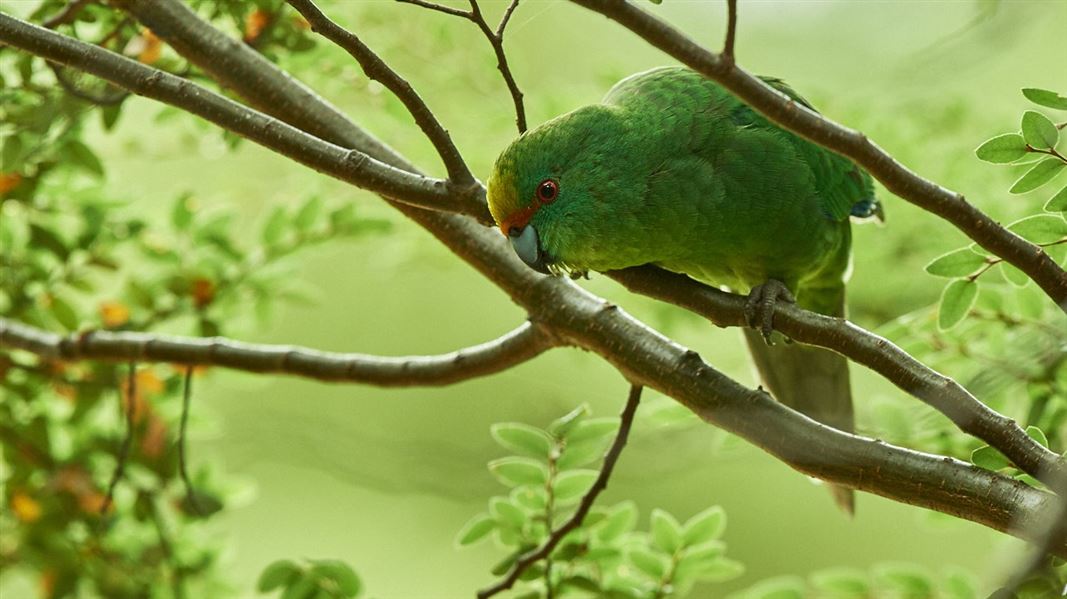Archived content: This media release was accurate on the date of publication.
Date: 29 April 2020 Source: Office of the Minister of Conservation
Today 18 of Aotearoa’s rarest forest bird, the kākāriki karaka/orange-fronted parakeet, are being flown from Ōtautahi Christchurch for release into the Canterbury high country as part of the recovery programme for the species, the Minister of Conservation Eugenie Sage announced today.
“I’m delighted that after record breeding last year, these distinctive rare birds are set to fly free from their bubble into Lake Sumner Forest Park,” said Eugenie Sage.
“It’s a great marker of success for the population of this budgie sized native bird. Kākāriki karaka/orange-fronted parakeet are a taonga species for Ngāi Tahu. They eat seeds and insects and during last year’s mega-mast, seeds were abundant, dominated their diet and boosted breeding.”
“The transfer of 18 kākāriki today follows the successful release of 15 birds at the same site in the South Branch of the Hurunui River valley in March before Alert Level 4 started. Releasing birds into the wild is a vital part of the recovery plan for this critically endangered species.”
DOC is working with Ngāi Tahu, the Isaac Conservation and Wildlife Trust (ICWT) and Christchurch Helicopters, to transfer orange-fronted parakeets/kākāriki karaka from the Trust’s aviaries at McLean’s Island into the South Branch of the Hurunui valley, following strict COVID-19 protocols.
“The young captive-bred kākāriki were due to be released several weeks ago and this has now become more urgent for the welfare of the birds and to free up much-needed space in the aviary.”
“Monitoring before the lockdown showed the birds released last month had teamed up with wild kākāriki. DOC is hoping this new group of birds does the same.”
“Christchurch Helicopters’ practical assistance with the recovery programme, transporting birds and eggs, staff and equipment and raising additional funds is much appreciated.”
“I want to acknowledge the tremendous work and expertise of the Isaac Conservation and Wildlife Trust in the success of the orange-fronted kākāriki recovery programme, and providing essential wildlife services during the lockdown,” said Eugenie Sage.
The rarest of New Zealand’s six kākāriki species, orange-fronted parakeet is found only in the Hawdon and Poulter valleys in Arthur’s Pass National Park and the Hurunui South Branch in Lake Sumner Forest Park. A successful population has also been established on Blumine Island/Oruawairua in the Marlborough Sounds. The population is estimated at 200-300 birds.
While a lot of DOC's fieldwork is on hold under Alert Level 3, some urgent and high priority conservation work is being carried out, providing that this can be done in a way that is safe for staff and meets requirements to avoid the spread of COVID-19.
Background information
DOC works in partnership with Ngāi Tahu to lead the kākāriki karaka/ orange-fronted parakeet recovery programme, which includes extensive predator control in their mainland habitat, captive breeding and maintaining a pest-free island population.
The Isaac Conservation and Wildlife Trust (IWCT), Auckland Zoo, Orana Wildlife Park, Christchurch Helicopters and Canterbury University all provide crucial support for this programme.
ICWT has bred more than 500 orange-fronted parakeets since 2003 for release on predator-free islands and back into Canterbury valleys.
Christchurch Helicopters also supports the orange-fronted kākāriki programme through flights and leading the Flight Path fundraising initiative for Canterbury businesses to get behind the recovery programme.
Handling and transport of the birds will follow COVID-19 requirements with the people involved maintaining physical distance at each transfer point, using PPE (personal protective equipment) and following strict biosecurity and hygiene standards.
Four DOC rangers, who share the same bubble, will drive into the valley to receive the birds from Christchurch Helicopters and put them into two on-site aviaries with food for two days, before releasing them into the wild.
‘Soft release’ of the birds into aviaries allows them to adapt to their new environment and increases their survival rate. While in the valley the rangers will top up feeding stations and check traps in the immediate area before returning on Friday.
The kākāriki will be monitored remotely by cameras in the release area as normal onsite monitoring has had to be scaled back due to restrictions on backcountry work under Alert Level 3.
Contact
For media enquiries contact:
Email: media@doc.govt.nz
